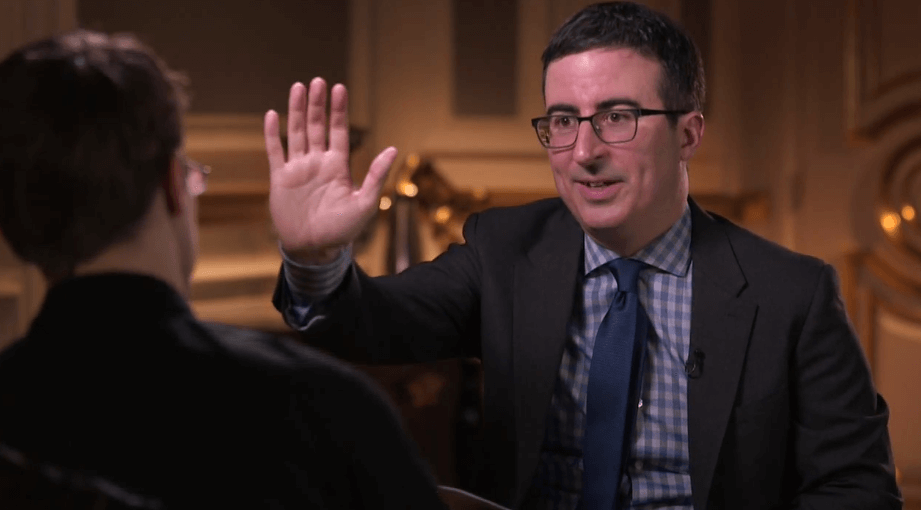
The Focus of their Conversation was on the Patriot Act
The Patriot Act was written in response to the infamous attacks on 9/11. Since that time, the order has been re-enacted and re-instituted without much ado. The country’s indifference to the Patriot Act vanished, however, in June 2013. That’s the date when Edward Snowden, a 29 year old former contractor with the National Security Administration, took responsibility for one of the biggest leaks in the US government’s history. Edward Snowden (not to be confused with Julian Assange, of Wikileaks fame) sat down with John Oliver recently to weigh in on the Patriot Act and the harm — as well as the good — that it is doing for Americans.
“It is vital that we have a discussion about this now,” John Oliver reminded his viewers, “because a vital date is just around the corner. I’m not saying that this is an easy conversation,” Oliver said, “but we have to have it.” June 1, 2015 will mark the reauthorization of the Patriot Act and all of the controversial provisions therein.
It’s been two years: What do Americans think now?
Two years after Snowden’s contentious and very public breach of security, the citizens of the United States still haven’t quite decided what they think about the Patriot Act and the information that Snowden’s leak revealed. On March 16, 2015, the Pew Research Center released poll results which indicated that nearly half of all Americans (46%) describe themselves as not very or not at all concerned about government surveillance.
The government has argued that their inquiries are monitored by third-party organizations, like the Foreign Intelligence Surveillance Act (FISA), an agency designed to protect the interests of American citizens. However, the FISA has approved, from 1979 to 2013, over 25,434 applications for surveillance; the organization has rejected only 12. Another alarming statistic indicates that the organization’s prying eyes haven’t done much good for all of their surveillance. Since the Patriot Act was enacted, the surveillance program has stopped only one, relatively small-scale, terrorist plot involving a cab driver in San Diego.
“The NSA has the greatest surveillance capabilities that we have ever seen in history,” said Snowden when asked why he leaked sensitive government documents in the first place. He admits that the NSA has a great purpose, and that their input is valuable. People shouldn’t want domestic surveillance, Snowden said, because of the way spies wield the information that they glean.
Once he made his theft of classified government documents public knowledge, Snowden elected to distribute that information through hand-selected journalists and news media outlets: “These journalists are using extraordinary security measures to ensure that this is being reported in the most responsible way.” He claimed that he himself didn’t want to be responsible for releasing this sensitive intelligence; as it turns out, these facts and figures weren’t necessarily safe in the hands of our nation’s journalists, either. The New York Times, for example, famously leaked intelligence accidentally, thanks to a shoddily redacted bit of text.
Snowden Explained Why He Leaked All of Those Documents
“I did this to give the American people a chance to decide for themselves the type of government that they want to have. That is a conversation that I think the American people deserve to decide.” The problem, Oliver and Snowden explored in their broadcasted dialogue, is that the issues surrounding the government’s reach are not clear or transparent to most taxpayers. This makes it hard for the American people to give any sort of informed consent to harvest their personal information.
Take Section 215, for example, which has been nicknamed the Library Records Provision. This arrangement allows access to records and other items under the FISA. This clause requires businesses to hand over “any tangible thing” that might be of interest to the government in its efforts to protect the nation against international terrorism (which things, of course, being solely at the government’s discretion). Since the time of the bill’s enactment, even the principal author (Rep. James Sensenbrenner) has suggested that Section 215 be revised.
This means that the government can (and has been) collecting and storing phone records from many Americans, most of whom do not have any connection to terrorism. While this is not to be confused with the phone calls themselves (names or content associated with a phone call), this does mean that phone numbers and duration of calls are under scrutiny.
Snowden and Oliver summed up a few of the other unsettling highlights of the Patriot Act that the American people might care about the most in their on-camera conversation. Some of this information is as follows:
At present, the bulk collection of information, including photos, is allowed provided that those communications are foreign on one side. This is possible because, while you may only be communicating with others in the United States, many service providers and hosts for cellular data and email communications transfer, store or ping data to other services overseas.
What is Prism and Snapstream?
Prism is an organization that is deputized by the government to partner with communications companies — Gmail and Yahoo, for example — to search for keywords and vital info in citizens’ messages.
Snapstream is a company that makes it possible to capture information while it is in transition.
Mystic makes it possible to access the content of a handful of American conversations, provided that these citizens can be characterized by a very specific set of parameters (having visited the Bahamas, for example).
Section 215 allows the information concerning how long phone calls are, as well as which numbers are involved in these calls, to be recorded and stored for analysis.
What Does Snowden and John Oliver want us to do?
Snowden concluded that we shouldn’t change our behavior just for fear of being caught in the snare of domestic data collection. “If we sacrifice our values because we are afraid,” Snowden said, “then we don’t care about them very much at all.” Instead, he and John Oliver hope that Americans will pay attention to this issue in the coming months, and will initiate a dialogue with their government before the Patriot Act is reinstated, unaltered, for another two years.




